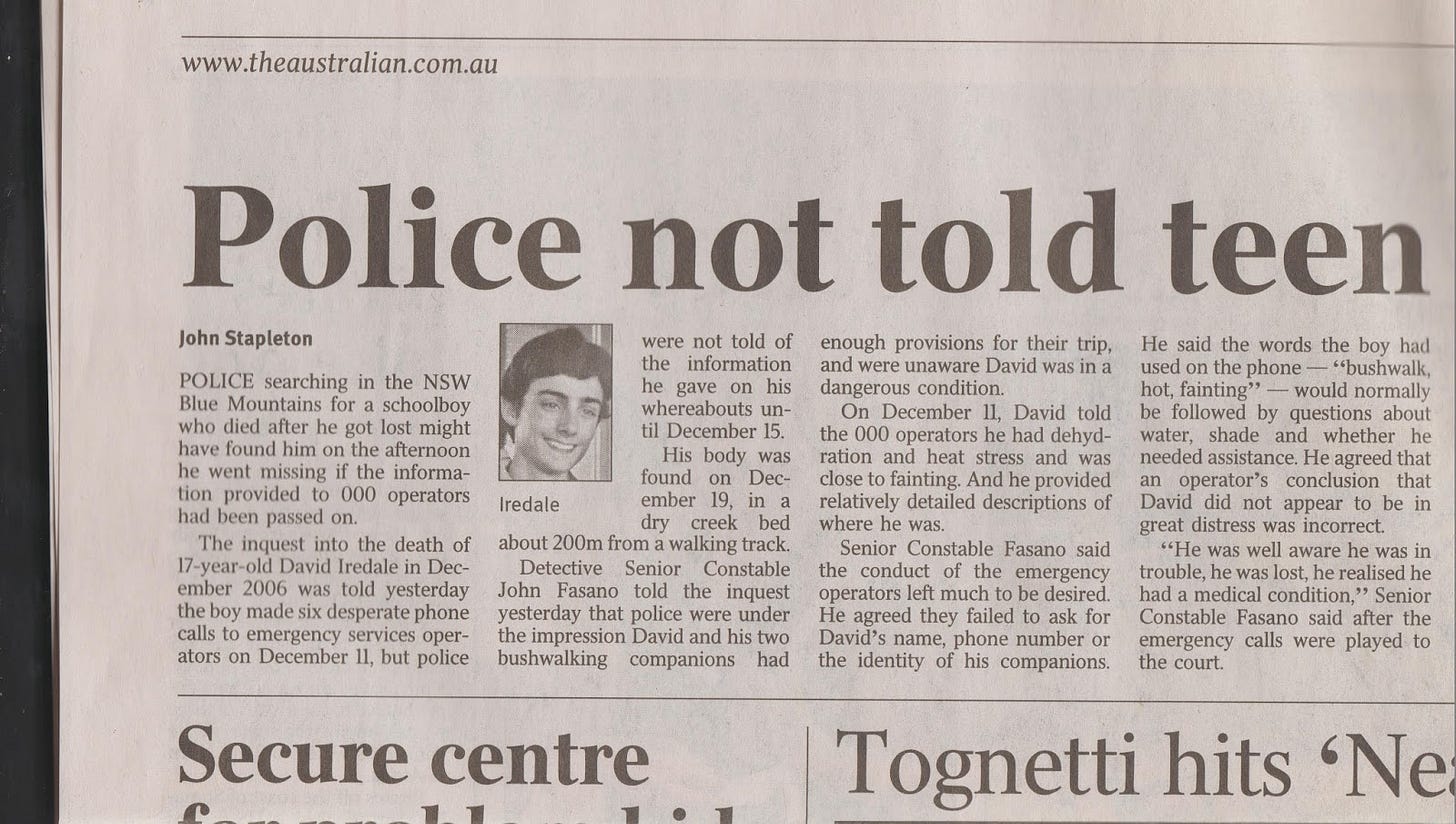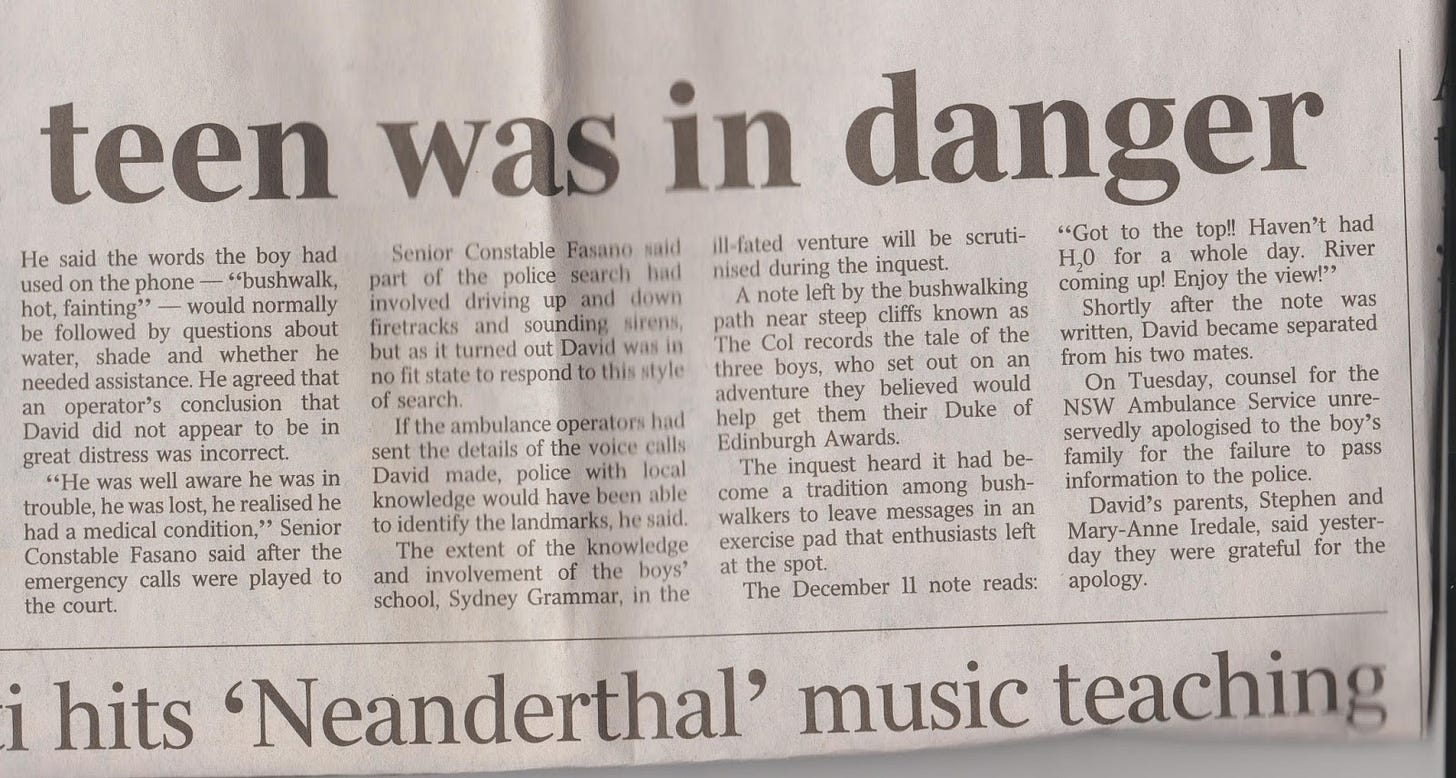Police not told teen was in danger, The Australian, 16 April, 2009.


Police not told teen was in danger
Stapleton, John. The Australian [Canberra, A.C.T] 16 Apr 2009: 7.
Abstract
Detective Senior Constable John Fasano told the inquest yesterday that police were under the impression [David Iredale] and his two bushwalking companions had enough provisions for their trip, and were unaware David was in a dangerous condition.
Senior Constable Fasano said the conduct of the emergency operators left much to be desired. He agreed they failed to ask for David's name, phone number or the identity of his companions. He said the words the boy had used on the phone -- "bushwalk, hot, fainting" -- would normally be followed by questions about water, shade and whether he needed assistance. He agreed that an operator's conclusion that David did not appear to be in great distress was incorrect.
David's parents, Stephen and Mary-Anne Iredale, said yesterday they were grateful for the apology.
Full Text
POLICE searching in the NSW Blue Mountains for a schoolboy who died after he got lost might have found him on the afternoon he went missing if the information provided to 000 operators had been passed on.
The inquest into the death of 17-year-old David Iredale in December 2006 was told yesterday the boy made six desperate phone calls to emergency services operators on December 11, but police were not told of the information he gave on his whereabouts until December 15.
His body was found on December 19, in a dry creek bed about 200m from a walking track.
Detective Senior Constable John Fasano told the inquest yesterday that police were under the impression David and his two bushwalking companions had enough provisions for their trip, and were unaware David was in a dangerous condition.
On December 11, David told the 000 operators he had dehydration and heat stress and was close to fainting. And he provided relatively detailed descriptions of where he was.
Senior Constable Fasano said the conduct of the emergency operators left much to be desired. He agreed they failed to ask for David's name, phone number or the identity of his companions. He said the words the boy had used on the phone -- "bushwalk, hot, fainting" -- would normally be followed by questions about water, shade and whether he needed assistance. He agreed that an operator's conclusion that David did not appear to be in great distress was incorrect.
"He was well aware he was in trouble, he was lost, he realised he had a medical condition," Senior Constable Fasano said after theemergency calls were played to the court.
Senior Constable Fasano said part of the police search had involved driving up and down firetracks and sounding sirens, but as it turned out David was in no fit state to respond to this style of search.
If the ambulance operators had sent the details of the voice calls David made, police with local knowledge would have been able to identify the landmarks, he said.
The extent of the knowledge and involvement of the boys' school, Sydney Grammar, in the ill-fated venture will be scrutinised duringthe inquest.
A note left by the bushwalking path near steep cliffs known as The Col records the tale of the three boys, who set out on an adventure they believed would help get them their Duke of Edinburgh Awards.
The inquest heard it had become a tradition among bushwalkers to leave messages in an exercise pad that enthusiasts left at the spot.
The December 11 note reads: "Got to the top!! Haven't had H20 for a whole day. River coming up! Enjoy the view!"
Shortly after the note was written, David became separated from his two mates.
On Tuesday, counsel for the NSW Ambulance Service unreservedly apologised to the boy's family for the failure to pass information tothe police.
David's parents, Stephen and Mary-Anne Iredale, said yesterday they were grateful for the apology.
Credit: John Stapleton



